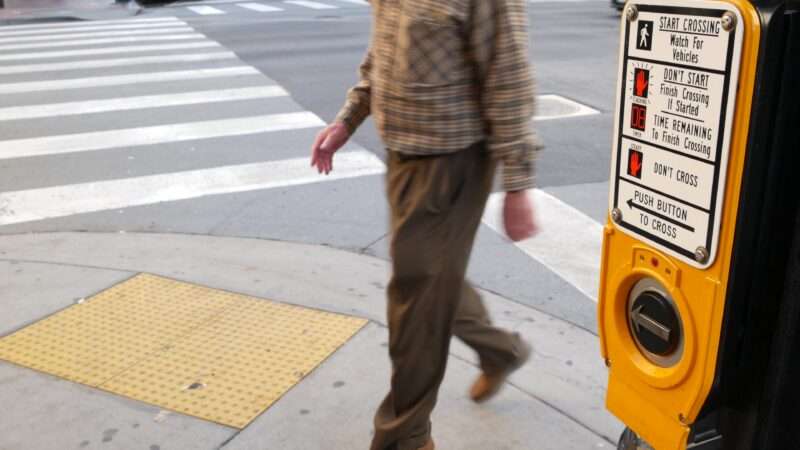
California will soon decriminalize jaywalking, which will do away with enforcement of a policy that critics say allows police to punish pedestrians with needlessly expensive fines, often in racially-motivated ways.
In September, Democratic Gov. Gavin Newsom signed the Freedom To Walk Act, which will decriminalize jaywalking in the state. Critics have long noted that anti-jaywalking laws, which criminalize crossing the street outside of designated crosswalks, often levy harsh fines on pedestrians and do little to increase public safety. They argue those laws give the police a reason to write hefty tickets disproportionately to black and Hispanic pedestrians. California, which pioneered anti-jaywalking statutes, is reversing course—a decision that other states will hopefully replicate.
The Freedom to Walk Act will leave California's anti-jaywalking statutes on the books, but will prevent police from ticketing people who jaywalk safely until 2029. However, the law does not completely eliminate pedestrian safety requirements. After it goes into effect at the start of the new year, police will still be able to ticket individuals who cross the street when a "reasonably careful person would realize that there is a danger of collision." This leaves the door open to uneven enforcement, albeit for an offense involving directly reckless behavior.
Jaywalking tickets can often accumulate and lead to burdensome debts for low-income individuals. Jason Sarris, a formerly homeless man, told The New York Times that his jaywalking tickets and tickets for similar offenses amounted to nearly $5,000 in fines, making it difficult to begin rebuilding his life. "I couldn't afford to pay [the tickets]," Sarris told the Times. "I was well known as a homeless person, and I got targeted."
At least in some localities, low-income and homeless pedestrians do appear to be particularly likely to receive jaywalking tickets. For example, according to a 2019 analysis by The Salt Lake Tribune, two-thirds of Salt Lake City's jaywalking tickets were handed out in a one-block radius of an area known to be a hub of the city's homeless services. In Bakersfield, California, 92 percent of jaywalking citations occurred in low-income census tracts. In 2020, an unarmed homeless man named Kurt Reinhold was fatally shot after an Orange County police officer stopped him for jaywalking, an incident which California Assemblymember Phil Ting (D–San Francisco), who introduced the Freedom To Walk Act, said inspired his law.
Jaywalking tickets also appear to be disproportionately handed out along racial lines in many localities. In San Diego, for example, black pedestrians received 16 percent of all jaywalking tickets between 2015 and 2021, despite making up only 6 percent of the city's population. In New York City, 90 percent of jaywalking tickets written in 2019 were handed out to black and Hispanic pedestrians.
"Jaywalking laws do more than turn an ordinary and logical behavior into a crime," Jared Sanchez, senior policy advocate for CalBike, said in Ting's press release. "They also create opportunities for police to racially profile."
Decriminalizing jaywalking is a commonsense measure that would make it harder for police to single out homeless and minority pedestrians. By embracing reform, California is reaffirming the right to safely cross the street without worrying about hefty fines or police harassment.
The post Decriminalizing Jaywalking in California Will Help Reduce Police Harassment appeared first on Reason.com.







